| Spotlight
Festival going beyond borders
India Bangladesh Festival of Books and Writers
Sarah Z H
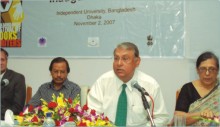 While talking about cross border issues in literature Syed Shamsul Haq said that the people of India and Bangladesh still feel a sense of connection and affinity as many of them share a common past and common cultural heritage. He was speaking at the gala event named While talking about cross border issues in literature Syed Shamsul Haq said that the people of India and Bangladesh still feel a sense of connection and affinity as many of them share a common past and common cultural heritage. He was speaking at the gala event named
"India Bangladesh Festival of Books and Writers" organised jointly by IBCI (Indo Bangla Cultural Initiative), IUB (Independent University of Bangladesh), ACPAB (Academic and Creative Publishers Association of Bangladesh) and the Indian High Commission. IUB, the academic partner hosted the first three days of the festival in their campus in Baridhara from the 2nd to the 4th of November. Professor Niaz Zaman, The locomotive behind this beautiful collaboration welcomed everyone to the opening session of the festival.
 The Indian High Commissioner to Bangladesh H.E Pinak Ranjan Chakravarty expressed his gratitude to Professor Niaz Zaman, Lubna Marium and his wife Dr. Radha Chakravarty for working day and night to make this programme happen. He took pride in calling Bengal 'the repository of literature' and felt honored to be a part of the programme. Among others who spoke in the inaugural session were Professor Bazlul Mobin Chowdhury, Vice-Chancellor of IUB, Professor Serajul Islam Choudhury, Professor Syed Manzoorul Islam and Chairman of ESTCDT, Mr Towheed Samad. The Indian High Commissioner to Bangladesh H.E Pinak Ranjan Chakravarty expressed his gratitude to Professor Niaz Zaman, Lubna Marium and his wife Dr. Radha Chakravarty for working day and night to make this programme happen. He took pride in calling Bengal 'the repository of literature' and felt honored to be a part of the programme. Among others who spoke in the inaugural session were Professor Bazlul Mobin Chowdhury, Vice-Chancellor of IUB, Professor Serajul Islam Choudhury, Professor Syed Manzoorul Islam and Chairman of ESTCDT, Mr Towheed Samad.
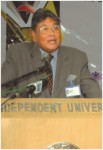 The first day of the program was divided into two academic sessions or panel discussions as they were termed by the organisers, in which discussants talked on different topics like Translation and its Discontents and Re-situating language. The discussants included Professor Shupriya Choudhuri, Eminent writer Sunil Gangopadhay, Nabaneeta The first day of the program was divided into two academic sessions or panel discussions as they were termed by the organisers, in which discussants talked on different topics like Translation and its Discontents and Re-situating language. The discussants included Professor Shupriya Choudhuri, Eminent writer Sunil Gangopadhay, Nabaneeta
Dev Sen, Fakrul Alam, Aruna Chakravarti and Shubhashish Talpatra. Professor Shupriya Choudhuri chaired the dialogue. Pratik Kanji Laal who replaced Nabaneeta Dev Sen on behalf of 'Little Magazine', Delhi read out from a speech written by Nabaneeta that touched upon issues like distortion of the author as he translates his own work. It suggested that translation should be done as a team of at least one native speaker from both source language and target language.
 Shubhashish Talpatra emphasized the significance of translation, as there is a growing market for the Indian sub continental literary work in the west. The discussion also talked about a translator's dilemma in choosing between fidelity and readability of the text. Fakrul Alam reminded us of the role of magazines and journals of both the countries to inform us about the works that are being published and translated. Sunil Gangopadhay glorified the art of translation as without it we would have never known about the works of Marquez, Dante or Tolstoy. He remarked that the 'sahibs' were unfortunate to have been unaware of 'Mahabharata' and 'Ramayana'. Thankfully, translation is likely to be their only way out! Shubhashish Talpatra emphasized the significance of translation, as there is a growing market for the Indian sub continental literary work in the west. The discussion also talked about a translator's dilemma in choosing between fidelity and readability of the text. Fakrul Alam reminded us of the role of magazines and journals of both the countries to inform us about the works that are being published and translated. Sunil Gangopadhay glorified the art of translation as without it we would have never known about the works of Marquez, Dante or Tolstoy. He remarked that the 'sahibs' were unfortunate to have been unaware of 'Mahabharata' and 'Ramayana'. Thankfully, translation is likely to be their only way out!
The next session was far more thought provoking and awakening as it discussed the Re-situation of language. Although there were controversies about the justification of the title, the dissertation bought out many interesting facts that stirred the audience a great deal. The panelists for the session were Professor Anisuzzaman, M. Assaduddin, Kh.Ashraf Hossain, Aly Zaker, Antara Dev Sen and Moyna Mazumder. Professor Anisuzzaman chaired the session and pointed out that English is slowly becoming the link language between the states of South Asia. He stressed on translating without filter language and resolved that this practice should be encouraged. Kh. Ashraf Hossain was the most erudite speaker in the session without a doubt as he described how we have a love-hate relationship with English language here in Bangladesh. He also raised an objection to the snobbery carried out by many writers of our country who write in English. Antara Dev Sen, the editor of 'Little Magazine' saw translation as storytelling. She said that a translator couldn't pluck the word out of the soil it has grown in. It is important to go on as not all translations will be perfect but it will make itself understood. Moyna Mazumder who represented 'Katha' said that while translating they try to assimilate the rhythms and nuances of the original without compromising readability. Aly Zaker shared with the audience his experience as translator in working for the theatre. He told stories of reworking the original text of Shakespeare into Bangla and its efficiency in amusing the spectators.
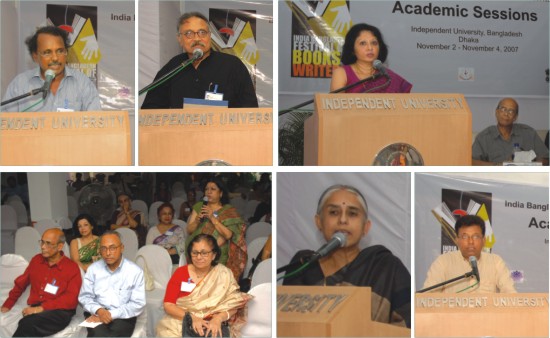
The second day of the festival was charted out to hold a discussion on three sessions. The first session of the day was based on the concept of Bangla: one language or two. The participants were Professor Rafiqul Alam, Kumkum Bhattacharya, Monsur Musa, Sajukta Dasgupta, Syed Mohammad Shahed and Shubhashish Talpatra. Professor Rafiqul Islam started his presentation by talking about different forms of Bengali language. The discussion brought out facts such as Bengali language in West Bengal seems limited and silted, while in Bangladesh it is infused with emotion and is not just the language of Vivek Ananda and Tagore. Monsur Musa clarified that Bengali language has to be looked at both from a micro and macro level to be understood as a result of four different faiths namely Islam, Hinduism, Christianity and Buddhism.
Bangladesh and India are like Siamese twins that would suffer severely if separated concluded Sanjukta Dasgupta.
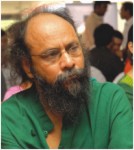 Bangla Academy's Chief Director Syed Mohammad Shahed remarked that the discussion topic was a superimposed question. He said it didn't quite occur to him that Bengali could be regarded as two different languages. Shubhashish Talpatra was extremely moved when he celebrated the night of Ekushey February (21st of February) here in Dhaka. He thought that the Bengali of West Bengal is greatly affected by English and is thus dying, whereas in Bangladesh it is being enriched day by day. This particular statement enkindled a blaze of hope in the hearts of the people present in the session. Bangla Academy's Chief Director Syed Mohammad Shahed remarked that the discussion topic was a superimposed question. He said it didn't quite occur to him that Bengali could be regarded as two different languages. Shubhashish Talpatra was extremely moved when he celebrated the night of Ekushey February (21st of February) here in Dhaka. He thought that the Bengali of West Bengal is greatly affected by English and is thus dying, whereas in Bangladesh it is being enriched day by day. This particular statement enkindled a blaze of hope in the hearts of the people present in the session.
As we are all familiar with the reality of women getting special attention in any occasion regardless of subject matter, this festival too had one or two sessions exclusively dedicated to the women writers and publishers from Bangladesh and the West Bengal. The panel that overflowed with women's writings from both the worlds took in a batch of women panelists such as Professor Firdous Azim, Shormishtha Panja, Sonia Nishat Amin, Shaheen Akhter and Mandira Sen. The panel discussed feminist issues, women in successful translation, the evolution of women writers, women studies and publication in the region, women creative writers of minority groups and women's contribution to the literature of Bengal. A number of anthologies were mentioned which includes writing by women from both Bangladesh and India.
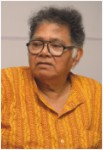 The next session and the last one for the day was on reviewing across borders. The participants were Professor Fakrul Alam who chaired the session, Syed Shamshul Haq, Shupriya Choudhuri, Dr Radha Chakravarty and Niaz Zaman. Syed Shamshul Haq deliberately lead us to the truth of the trivia of cross border issues and how the sense of danger is always evident in uttering this very word. He pointed out that we eagerly read Marquez or Neruda but never try to look at the literature of our neighboring countries like Assam, Nagaland or Tripura who actually share borders with us. Professor Niaz Zaman talked about the need of devoted journals in the country to review the writings of Bangladesh and India. Radha Chakravarty shared her thought on how a good review should be incomplete in the sense that it is able to captivate the reader in such a way so that to find out more on the book, the reader decides to go for it. The next session and the last one for the day was on reviewing across borders. The participants were Professor Fakrul Alam who chaired the session, Syed Shamshul Haq, Shupriya Choudhuri, Dr Radha Chakravarty and Niaz Zaman. Syed Shamshul Haq deliberately lead us to the truth of the trivia of cross border issues and how the sense of danger is always evident in uttering this very word. He pointed out that we eagerly read Marquez or Neruda but never try to look at the literature of our neighboring countries like Assam, Nagaland or Tripura who actually share borders with us. Professor Niaz Zaman talked about the need of devoted journals in the country to review the writings of Bangladesh and India. Radha Chakravarty shared her thought on how a good review should be incomplete in the sense that it is able to captivate the reader in such a way so that to find out more on the book, the reader decides to go for it.
The final day of the festival at IUB and the wrapping up academic sessions were all on cross border issues approached from different dimensions. The primeval session was about research across a border, which was moderated by Professor Shormishtha Panja and lead on by a panel of speakers like eminent women writers of Bangladesh Selina Hossain, Aali A Rahman and Minoti Chattarjee.
In this session gave personal account of why they have picked up research, how they managed to get to what they were looking for, the problems they faced and the results that came out. The discussions were lively and varied from one discussant to another allowing the audience to learn more intensively about the many ways of research and its importance.
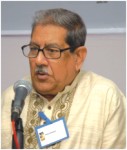 The second academic session that exposed numerous issues on publishing across borders was a heated dialogue as the subject itself bore many controversies and prohibition. The session was chaired by Professor Kaiser Haq and the panelists were Professor Firdous Azim, Sudeep Sen,Tridip Kumar Chattopadhay, Mohiuddin Ahmed and Mofidul Haque. The session discussed many important issues related to publications such as undoing the existing boundaries to bring together the works of the writers from both sides and restructure South Asia as a whole new world. Language should not be the primary concern when publishing a good piece of writing. Tridip Kumar Chattopadhay mesmerized the audience by presenting the historical context of the publishers of Bengal. All the panelists agreed on working in unison to promote the writings of Bangladesh and India by publishing the works in both the countries. Mofidul Haque suggested that various forms of publishing a work could be practiced to improve the situation. The second academic session that exposed numerous issues on publishing across borders was a heated dialogue as the subject itself bore many controversies and prohibition. The session was chaired by Professor Kaiser Haq and the panelists were Professor Firdous Azim, Sudeep Sen,Tridip Kumar Chattopadhay, Mohiuddin Ahmed and Mofidul Haque. The session discussed many important issues related to publications such as undoing the existing boundaries to bring together the works of the writers from both sides and restructure South Asia as a whole new world. Language should not be the primary concern when publishing a good piece of writing. Tridip Kumar Chattopadhay mesmerized the audience by presenting the historical context of the publishers of Bengal. All the panelists agreed on working in unison to promote the writings of Bangladesh and India by publishing the works in both the countries. Mofidul Haque suggested that various forms of publishing a work could be practiced to improve the situation.
South Asian Writing in English was nevertheless a matter of less importance, especially in the modern times when English has become an inevitability. Professor Shawkat Hussain chaired the session and the discussants were Ritu Menon, Kaiser Haq, khademul Islam and Preeti Gill. Ritu Menon began by saying that "South Asian writing in English seemed to be a descendent of what used to be called 'Indo Anglican' and what is still called 'Commonwealth' ". The speakers spoke on issues like English is directly linked to the social hierarchy as it is the language of power, the role of English in the two countries is totally different. National professor Kabir Choudhury chaired the last session of the day thanking the organizers for such a wonderful initiative and welcomed each of the speakers to the stage to speak their minds. Professor Nazrul Islam of UGC mentioned that Asian society has come a long way in terms of scholarly publications and that we should be able to focus more on our own language while practicing other languages. Professor Omar Rahman - Pro Vice Chancellor of IUB gave a magnificent speech that covered all that could be said about the phenomenon of writing a book and its publication. Mr. Alimur Rahman Khan, Chairman of Shadhona generated laughter through his speech that discussed different aspects of writing and publishing a book and said that he was grateful to be a part of this festival. Dr. Radha Chakravarty expressed her deepest appreciation to the organizers and hoped that the evolving friendship between the two countries will grow stronger with each passing day. Finally Kabir Choudhury conveyed his heartfelt thanks to the organizers and the perseverant audience for making this venture an achievement to be remembered and celebrated with immense fondness for the days to come.
Here is special thanks to Professor Niaz Zaman and all the volunteers of IUB who have worked extremely hard to put together this extraordinary event.
Copyright
(R) thedailystar.net 2007
|

